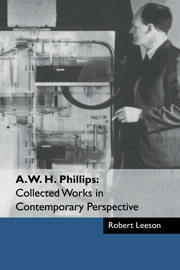Book contents
- Frontmatter
- Contents
- List of contributors
- Foreword by Arthur Brown
- Preface by Robert Leeson
- Part I Bill Phillips: Some Memories and Reflections
- 1 A. W. H. Phillips: An extraordinary life
- 2 The versatile genius
- 3 To be his colleague was to be his friend
- 4 Phillips' adaptive expectations formula
- 5 Economist – washing machine fixer
- 6 Playing around with some data
- 7 The Festschrift
- Part II The Phillips Machine
- Part III Dynamic Stabilisation
- Part IV Econometrics
- References
- Index of names
- Index of subjects
4 - Phillips' adaptive expectations formula
Published online by Cambridge University Press: 04 May 2010
- Frontmatter
- Contents
- List of contributors
- Foreword by Arthur Brown
- Preface by Robert Leeson
- Part I Bill Phillips: Some Memories and Reflections
- 1 A. W. H. Phillips: An extraordinary life
- 2 The versatile genius
- 3 To be his colleague was to be his friend
- 4 Phillips' adaptive expectations formula
- 5 Economist – washing machine fixer
- 6 Playing around with some data
- 7 The Festschrift
- Part II The Phillips Machine
- Part III Dynamic Stabilisation
- Part IV Econometrics
- References
- Index of names
- Index of subjects
Summary
When studying money demand in hyperinflations in 1951 with Milton Friedman, later published as the ‘Monetary Dynamics of Hyperinflations’ (Cagan 1956), I could not find a workable representation of the expected change in prices (the cost of holding money). Friedman happened to discuss the problem with Bill Phillips, who sug- gested relating the change in the expected rate to the difference between the actual and expected rates. When Friedman conveyed this suggestion to me, I converted the implied differential equation into an exponentially weighted average of past price changes and found it provided an empirically workable money demand equation. Phillips deserves credit for what later came to be called ‘adaptive expectations’.
When rational expectations captured the attention of the profession in the 1960s (following Muth's famous article), adaptive expectations were largely abandoned. Years later, I became aware that data on forward exchange rates existed for the German hyperinflation and could be used as observed expectations of changes in exchange rates and as proxies for expectations of price inflation. These data provided an opportunity to test whether adaptive or rational expectations provided a better explanation of (at least the German) hyperinflation. The test appeared to validate Phillips' suggestion (Cagan 1991). This article explains why adaptive expectations can be viewed as ‘rational’ in those circumstances.
- Type
- Chapter
- Information
- Publisher: Cambridge University PressPrint publication year: 2000
- 3
- Cited by



